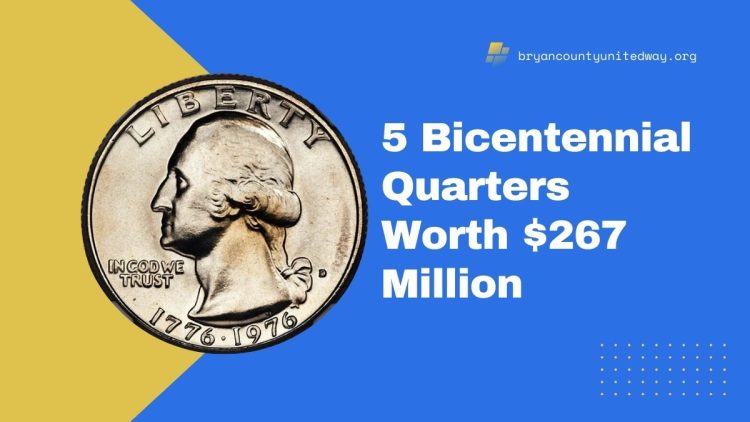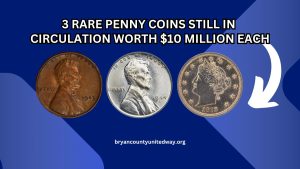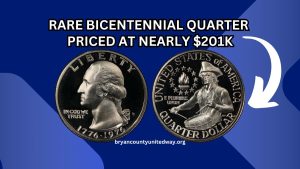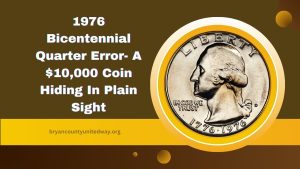Have you checked your spare change lately? That shiny 1976 quarter could be worth more than you ever imagined. While most Bicentennial Quarters are only worth 25 cents, a few rare versions have sparked intense interest in the coin-collecting world—some rumored to be worth as much as $267 million.
While that exact number may be inflated, several documented Bicentennial quarters are indeed highly valuable and extremely rare.
Let’s break down the 5 rarest Bicentennial Quarters, why they’re worth so much, and how to find out if you’ve got one in your pocket.
What Makes the 1976 Bicentennial Quarter Special?
To celebrate 200 years of American independence, the U.S. Mint released a special edition quarter in 1976. Unlike regular quarters, the reverse design features a colonial drummer boy and the dates 1776–1976 instead of the usual single date.
Tens of millions were minted, but only a handful possess the traits that make them valuable collector’s items.
Why Are Some Bicentennial Quarters Worth So Much?
The quarters that fetch sky-high prices usually have one or more of the following traits:
- Minting errors, such as double strikes or off-center prints
- No mint marks, especially on proof coins
- Struck in silver instead of clad materials
- Rare varieties, such as being struck on the wrong planchet
- Perfect or uncirculated condition, verified by professional graders
Collectors are willing to pay big money for these anomalies because of their rarity, history, and uniqueness.
5 Most Valuable Bicentennial Quarters
| Coin Variant | Estimated Value | Why It’s Valuable |
|---|---|---|
| 1976-S No S Proof Bicentennial Quarter | $45,000 – $55,000 | Missing mint mark from a proof set |
| 1976-D Double Die Obverse Quarter | $1,200 – $18,400 | Doubling on letters and numbers on the obverse |
| 1976-S Silver Proof Bicentennial Quarter | $8 – $20 (higher in grade) | 40% silver content from limited proof sets |
| 1976 Off-Center Bicentennial Quarter | $100 – $1,000+ | Part of design missing due to striking misalignment |
| 1976 Experimental Planchet Bicentennial Quarter | $10,000+ | Struck on wrong or unknown metal |
How to Spot One of These Rare Quarters
Want to know if your Bicentennial Quarter is one of the valuable ones? Here are the key signs to look for:
- Check the mint mark – Coins minted in San Francisco will have an “S.” If yours doesn’t, and it’s a proof-quality coin, that’s rare.
- Look for doubling – Inspect the lettering on the front (especially “IN GOD WE TRUST”) for double stamping.
- Inspect the edges – Silver quarters often have a solid silver edge, rather than a copper/nickel sandwich appearance.
- Check for off-center strikes – If the image or date is off-center, it might be a mint error worth money.
- Weigh your coin – A standard clad quarter weighs 5.67 grams. Silver quarters weigh around 5.75 grams.
If you suspect you have something special, consider having your coin professionally graded and appraised.
Can a Quarter Really Be Worth $267 Million?
Let’s set expectations straight: No Bicentennial Quarter has ever officially sold for $267 million. That number likely stems from exaggerated online claims or misinterpretations.
However, it’s true that high-grade or unique-error Bicentennial Quarters have sold for tens of thousands of dollars, and their value continues to grow with time and rarity.
While you probably won’t become a millionaire from a single quarter, some lucky finds have absolutely changed collectors’ lives.
| Feature to Look For | Why It Matters |
|---|---|
| Missing Mint Mark (“No S”) | Signifies a rare proof error |
| Double Die Obverse | Doubling of text increases value |
| Silver Content | 40% silver is more valuable than clad |
| Off-Center Strike | Errors are highly sought after |
| Condition | Uncirculated or high-graded coins sell big |
While most Bicentennial Quarters are only worth 25 cents, a lucky few could be worth thousands—or more. Whether it’s due to an error, composition, or perfect condition, these coins continue to gain value in the world of collectors.
So before you drop that old quarter into a vending machine, take a closer look. That small coin in your pocket could be the gateway to a massive windfall.
FAQs
How do I know if my Bicentennial Quarter is silver?
Check the edge of the coin. If it lacks the orange-colored copper band, it may be silver. Weighing it is also helpful—silver versions weigh slightly more.
Where can I sell a rare Bicentennial Quarter?
You can sell it through coin dealers, auctions, coin shows, or online platforms like eBay—but for rare pieces, professional grading is recommended first.
Is it worth getting my Bicentennial Quarter graded?
Yes—especially if your coin shows signs of rarity, minting e




